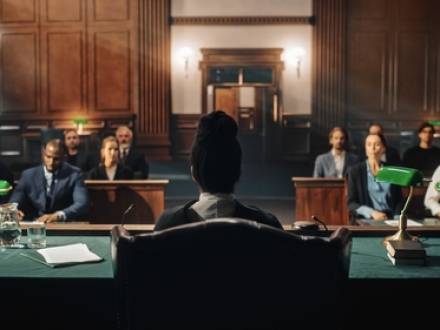Recent Blog Posts
Can One Lawyer Handle a Divorce for Both Spouses?
 The CDC estimates that over 650,000 divorces happen every year. By some estimates, around 90 percent of those divorces are uncontested, meaning spouses are able to agree on everything before they file for divorce.
The CDC estimates that over 650,000 divorces happen every year. By some estimates, around 90 percent of those divorces are uncontested, meaning spouses are able to agree on everything before they file for divorce.
If you have recently made the decision to get a divorce, you probably have many questions. How much will divorce in Illinois cost? How long does it take to get divorced? What can I expect from my divorce? All of these questions are a normal part of figuring out the divorce process.
Many people facing divorce also ask themselves whether they really need a lawyer, especially if they want to file for an uncontested divorce. They worry that hiring an attorney will send the wrong message, or increase tension between them and their ex. Can’t you just hire the same attorney to represent both of you in your Illinois divorce?
What You Should Know About Non-Parent Visitation in Illinois
 After your divorce is finalized, you and your family will begin new journeys with a different way of life. When you and your ex-spouse share children, arrangements for parenting time and parental responsibilities must be made.
After your divorce is finalized, you and your family will begin new journeys with a different way of life. When you and your ex-spouse share children, arrangements for parenting time and parental responsibilities must be made.
These new arrangements create routines and lifestyles that may feel unfamiliar at first. While adjusting takes time, these changes often lead to happier and healthier homes for you and your children.
Your family situation may involve other important people besides yourself, your ex, and your kids. Grandparents, stepparents, siblings, and close family friends often play significant roles in children's lives. Understanding who can have visitation rights and how these arrangements work is often an important part of life after divorce or separation. Our Kane County child custody lawyers can explain more.
Who Decides Where a Child Goes to School After Divorce?
 Imagine this: You and your ex are divorced, and you disagree about where your child should attend school. You want your child to stay at their current school where they have friends and familiar teachers; your ex wants to enroll them in a different district. You both want to know who gets to make this decision.
Imagine this: You and your ex are divorced, and you disagree about where your child should attend school. You want your child to stay at their current school where they have friends and familiar teachers; your ex wants to enroll them in a different district. You both want to know who gets to make this decision.
Sound familiar? This is a very common scenario for couples with minor children who are still in school. Where a child goes to school, and when you can change that school, depends on what your divorce decree says about decision-making authority. Some parenting plans allow one parent to make all these decisions; other plans require both parents to agree before any major changes can be made.
If you and your child’s other parent are fighting about where your child goes to school, call our Yorkville, IL child custody lawyers. We will help you understand the terms of your parenting plan and, if the circumstances call for it, ask the court for permission to change your parenting plan so you have more say over your child’s education.
How Are Workers’ Compensation Benefits Treated in an Illinois Divorce?
 If you were injured at work, your workers’ compensation benefits may help you and your family stay financially stable. These payments can cover medical bills, lost wages, and therapy costs. What happens when a person who is receiving workers’ compensation benefits gets divorced?
If you were injured at work, your workers’ compensation benefits may help you and your family stay financially stable. These payments can cover medical bills, lost wages, and therapy costs. What happens when a person who is receiving workers’ compensation benefits gets divorced?
Illinois law has guidelines to help decide whether your workers’ compensation payments count as marital property. It also determines how they might affect child support or alimony. If you are in this situation, a St. Charles, IL divorce lawyer can help protect your rights and explain how the law applies to your case.
Are Workers’ Compensation Benefits a Marital Asset in Illinois?
In Illinois, most assets that you or your spouse acquire during the marriage are considered marital property. That means both of you have a legal interest in them. The Illinois Marriage and Dissolution of Marriage Act, in 750 ILCS 5/503, explains how marital property is defined and divided during divorce.
Five Factors When Dividing Vehicles in a Divorce
 For most families in the U.S., a vehicle is a necessity. It can even have an emotional element. When divorce is on the table, it may be a marital asset that must be divided among the spouses. Working with an experienced Kane County, IL divorce lawyer can help you avoid mistakes and ensure the division of vehicles and other property is fair and clearly documented.
For most families in the U.S., a vehicle is a necessity. It can even have an emotional element. When divorce is on the table, it may be a marital asset that must be divided among the spouses. Working with an experienced Kane County, IL divorce lawyer can help you avoid mistakes and ensure the division of vehicles and other property is fair and clearly documented.
What Do You Need To Consider When Dividing Your Vehicles in a Divorce
Dividing vehicles may seem simple if you own two cars. You might assume it is as easy as you take one, and your spouse takes the other. However, hidden factors like debt, ownership records, and vehicle value can make this process much more involved. If you and your spouse cannot reach an agreement, a judge will make the final decision based on all relevant details. Consider some questions that can guide you through this process.
Is the Vehicle a Marital or Separate Property?
10 Great Apps for Divorcing Parents
 Divorce changes your family dynamic. You may need help finding ways to plan schedules, share information, and stay in touch with your co-parent. The right tools can make this easier. Today, parents often use apps to keep communication clear and reduce stress. These apps can also help you keep accurate records and avoid arguments.
Divorce changes your family dynamic. You may need help finding ways to plan schedules, share information, and stay in touch with your co-parent. The right tools can make this easier. Today, parents often use apps to keep communication clear and reduce stress. These apps can also help you keep accurate records and avoid arguments.
Below are 10 helpful apps that many divorcing parents use to stay organized and reduce conflict. To learn more about your rights and build a parenting plan that works for your family, contact Goostree Law Group. Our Wheaton, IL child custody lawyer has walked many families through the custody process and can help you work out any issues.
AppClose: Best for All-in-One Free App for Co-Parenting Tools
AppClose gives parents many helpful tools for free. You can message the other parent, share calendars, and keep track of expenses all in one place. The app saves every message and does not allow you to delete or edit them. This helps avoid confusion later and keeps communication professional. You can also create shared task lists so both parents know what needs to be done.
How Much Child Support Do You Pay if You Become Unemployed?
 Losing a job is one of the most stressful experiences in life, especially for parents who are raising children. If you have recently become unemployed, you may be wondering what happens to your child support obligations and whether unemployment payments cover the cost of child support.
Losing a job is one of the most stressful experiences in life, especially for parents who are raising children. If you have recently become unemployed, you may be wondering what happens to your child support obligations and whether unemployment payments cover the cost of child support.
In Illinois, parents are still responsible for supporting their children even when their income changes. However, the law allows for parents to change their child support orders when a substantial change in financial circumstances occurs, such as job loss or reduced hours. Acting quickly and following the correct procedures can make a major difference in how much you owe and how soon your payments can be adjusted.
At Goostree Law Group, our St. Charles child support lawyers help parents file for modifications, calculate new payment amounts, and protect themselves from child support enforcement while unemployed.
Can You Get Divorced in Illinois Without Going to Court?
 Divorce does not always have to involve a courtroom battle. In fact, despite what TV and film divorces portray, most divorces today do not involve litigation. Many couples in Illinois are choosing alternative paths that allow them to end their marriage with less conflict. In turn, this makes divorce less expensive and gives spouses more control over the outcome.
Divorce does not always have to involve a courtroom battle. In fact, despite what TV and film divorces portray, most divorces today do not involve litigation. Many couples in Illinois are choosing alternative paths that allow them to end their marriage with less conflict. In turn, this makes divorce less expensive and gives spouses more control over the outcome.
If you and your spouse are willing to work together, it may be possible to complete your divorce largely outside of court. However, it is important to understand what "staying out of court" really means. Likewise, having an experienced divorce attorney is still important, even in an uncontested or mediated divorce. To learn more, call the Yorkville divorce attorneys with Goostree Law Group.
What Does It Mean to Get Divorced Without Going to Court?
In Illinois, every divorce must be approved by a judge. However, that does not necessarily mean you will need to appear in court or go through a trial. Most divorces in 2025 are resolved outside of the courtroom, with the couple and their attorneys negotiating the terms privately. Once both parties agree on all major issues, the judge simply reviews and signs off on the final agreement.
Why Some Couples Choose Legal Separation Over Divorce
 Filing for divorce is one of the most serious and final decisions most people make in their lives. Even when spouses realize that they are unhappy together, they may not be totally sure that they want to end their marriage completely. For those who are unsure about whether divorce is the right step, legal separation can serve as a meaningful alternative.
Filing for divorce is one of the most serious and final decisions most people make in their lives. Even when spouses realize that they are unhappy together, they may not be totally sure that they want to end their marriage completely. For those who are unsure about whether divorce is the right step, legal separation can serve as a meaningful alternative.
In Illinois, legal separation allows a couple to live apart and set up boundaries while technically staying married. This option gives people time and structure to decide whether reconciliation is possible or whether a divorce should eventually follow. Some people simply stay legally separated forever.
If you are wondering whether legal separation is a path you may be interested in, contact our DuPage County family lawyers today.
What Is Legal Separation in Illinois?
Under Illinois law (750 ILCS 5/402), legal separation allows married spouses to live apart. Separated spouses can ask for a court order addressing issues such as property division, parenting responsibilities, child support, and alimony. Unlike divorce, however, legal separation does not end the marriage. A couple remains legally married and cannot remarry unless they later get officially divorced.
What to Expect at Your First Divorce Court Hearing in Illinois
 The first time you appear in court for your divorce can feel intimidating. Your first divorce court appearance sets the tone for how the rest of your case will go, and you may not know what to wear, how to act, what will happen, or how long it will take. Understanding what to expect, both legally and logistically, can make the experience far less stressful.
The first time you appear in court for your divorce can feel intimidating. Your first divorce court appearance sets the tone for how the rest of your case will go, and you may not know what to wear, how to act, what will happen, or how long it will take. Understanding what to expect, both legally and logistically, can make the experience far less stressful.
As of October 2025, Illinois divorce cases continue to follow the procedures outlined in the Illinois Marriage and Dissolution of Marriage Act. While every county has its own local rules, the process in DuPage County generally follows a predictable sequence. The more you understand before you arrive, the more confident you will feel when you stand before the judge. Our Wheaton divorce attorneys can prepare you for your first hearing and for everything that happens before and after.












